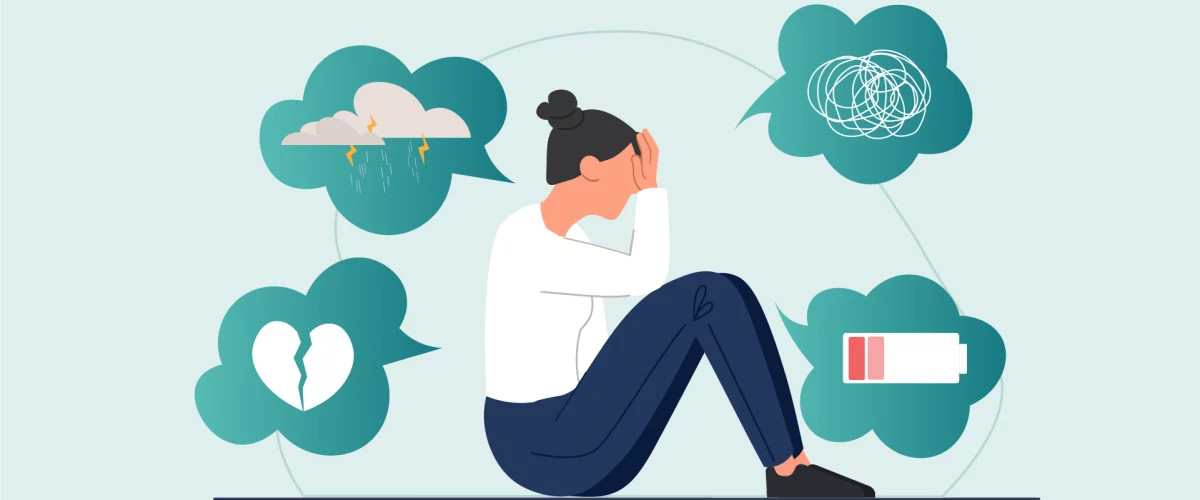Dry eye, a common condition characterized by insufficient tear production or poor tear quality, can significantly impact quality of life. Surprisingly, it is also linked to mental health disorders such as depression. In this article, we explore the connection between depression and dry eye disease, their combined impact on overall health, and the solutions available for affected individuals.
Recognizing Dry Eye and Depression Symptoms
Identifying the signs of dry eye and depression is crucial for proper management. Common dry eye indicators include persistent irritation, a gritty sensation and unusual light sensitivity may signal both conditions.
Depression might manifest as persistent sadness, loss of interest in activities, and changes in sleep patterns. In the context of eye health, people with depression may report worsening vision without apparent physical causes.
Notably, the severity of dry eyes symptoms often correlates with depression status. Patients reporting intense eye discomfort may benefit from mental health screening. Conversely, those diagnosed with depression should be aware of potential ocular issues.
Is dry eyes a symptom of anxiety?
Yes, dry eyes can indeed be a symptom of anxiety. Anxiety, particularly chronic stress, can trigger a range of physical symptoms, and eye discomfort is one of them. Anxiety leads to an increase in stress hormones such as cortisol. This can disrupt the normal functioning of the lacrimal glands, which are responsible for producing tears.
As a result, tear production may decrease, leading to dryness, irritation, and discomfort in the eyes. Furthermore, people with anxiety may engage in behaviors such as staring at screens for long periods, or rubbing their eyes, which can contribute to or worsen dry eye symptoms.
The Psychological Causes of Dry Eyes
The mind-body connection plays a crucial role in dry eye development. Chronic stress and anxiety can disrupt the delicate balance of tear production and quality. Research suggests that prolonged psychological distress may alter hormonal levels, affecting the function of lacrimal glands.
Certain mental health conditions, such as post-traumatic stress disorder (PTSD), have been linked to an increased incidence of dry eye symptoms. This connection may be due to heightened sympathetic nervous system activity, which can reduce tear secretion.
Understanding these psychological underpinnings helps clinicians develop comprehensive treatment plans that address both ocular and mental health aspects of dry eye disease.
The effects of depression on the eyes
Can Depression Affect Your Eyes?
Research has revealed a significant link between depression and ocular health. Individuals experiencing depression often report heightened light sensitivity and blurred vision. These visual disturbances stem from alterations in neurotransmitter levels, which influence pupil dilation and focusing abilities.
Moreover, depression-related inflammation throughout the body extends to ocular tissues, potentially exacerbating existing eye conditions. Chronic stress associated with depression can elevate intraocular pressure, raising concerns for glaucoma patients.
Can Depression Cause Dry Eyes?
Depression also impacts tear production, leading to an increased risk of dry eye syndrome. Studies show that people with depression have a higher prevalence of meibomian gland dysfunction, a key factor in tear film instability.
The reduced production of tears in patients with depression is often linked to hormonal imbalances, anxiety and chronic stress, which can alter the function of the lacrimal glands responsible for tear secretion.
Moreover, depression is associated with higher levels of inflammation throughout the body, including in the eyes, which can further exacerbate dryness. As the tear film becomes unstable, symptoms like irritation, burning, and blurry vision become more common, contributing to a decline in both ocular comfort and overall quality of life.
Diagnosis and treatment options
Diagnosing Dry Eye Disease and Depression
Diagnosing dry eye disease and depression can be complex due to the interrelation of symptoms. A healthcare professional typically begins with a comprehensive assessment of both ocular and psychological symptoms.
For dry eye syndrome, various tests are available to diagnose dry eye, including tear stability, lipid layer examination, meniscus height measurement, meibography and blink analysis. Patients may also be questioned about their medical history and lifestyle habits, including the use of computers and other digital devices, which can exacerbate symptoms.
Regarding depression, a mental health professional often uses standardized questionnaires, to assess the severity of depressive symptoms.
Treatment Options for Dry Eyes and Depression
The Role of Anti-Depressants in Dry Eye Syndrome
While antidepressant medications can be essential for managing depression, they may also contribute to the development or worsening of dry eye symptoms. Certain classes of antidepressants can decrease tear production as a side effect. These medications affect the balance of neurotransmitters, which not only impact mood but also influence the lacrimal glands’ ability to produce tears.
As a result, individuals on antidepressants may experience increased dryness, irritation, and discomfort in their eyes. If you are taking antidepressants and experiencing worsening dry eye symptoms, it is important to discuss these side effects with your healthcare provider, who may suggest alternative treatments or additional remedies to alleviate both your mental health and ocular concerns.
Therapy Approaches for Dual Management
Effectively managing both dry eye disease and depression requires a multifaceted treatment approach. For individuals suffering from both conditions, a combination of ocular treatments and psychological therapies can provide significant relief. Artificial tears preservative-free (short term) and IPL treatment (long term) are commonly used to address the symptoms of dry eyes.
In parallel, therapy options such as cognitive-behavioral therapy (CBT) or mindfulness-based stress reduction (MBSR) can help reduce the psychological factors contributing to dry eye symptoms, like stress and anxiety.
Additionally, lifestyle modifications such as regular breaks from screen time, improved hydration, and a balanced diet rich in omega-3 fatty acids can help both the body and mind, improving overall health and comfort.
Collaborating with both an ophthalmologist and a mental health professional ensures that both the ocular and psychological aspects of these conditions are addressed comprehensively.
Mental Health Help for Dry Eye Patients
For those dealing with dry eyes related to depression, seeking mental health support is crucial for long-term management.
Depression can exacerbate the physical symptoms of dry eyes, and in turn, the discomfort caused by dry eyes can worsen mental health. Addressing one condition without acknowledging the other can lead to less effective treatment outcomes. Seeking counseling, engaging in support groups, or participating in stress-relieving practices like yoga or meditation can help manage the emotional toll of chronic eye discomfort.
Moreover, mental health professionals can provide strategies to cope with the psychological challenges of living with a chronic condition. It’s important for patients to communicate openly about both their eye health and mental well-being with their healthcare providers, creating a holistic approach that promotes both emotional and physical healing.
Conclusion
The relationship between depression and dry eye highlights the complex interaction between mental and physical health. Understanding this connection is a crucial step toward improving the quality of life for affected individuals. It’s important to consult the healthcare professionals best suited to your problems, in order to understand them, make the right diagnosis and come up with a suitable treatment plan.
For more daily tips, click here to see our news on this subject.




